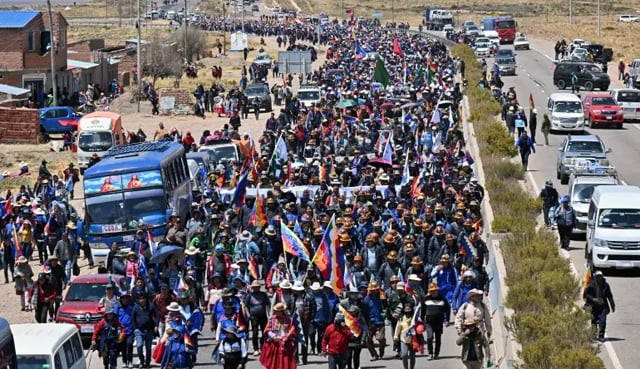
LA PAZ, Nov 23, 2024 (BSS/AFP) - Margarita Avila, a 66-year-old grocery seller, casts a stoic look at some of the closed stalls in the market where she works in La Paz.
"We've had some beautiful years," she says. "We knew how much we were going to earn, how much we had to spend."
But now, a shortage of dollars and widespread protests amid a power struggle between the incumbent president and his predecessor have plunged Bolivians into a state of perpetual uncertainty.
"There is nothing to save. Everything is day-to-day," said Avila, standing before racks of unsold products. "Prices go up overnight.
"And with all the fighting, they no longer care about us," she adds, referring to the dispute between ex-president Evo Morales and his successor, President Luis Arce.
For more than a year, Morales has been battling to wrest control of the left from Arce, his former economic minister, whom he now accuses of using the justice system to "ban" him from next year's elections.
Both men belong to the governing Movement for Socialism (MAS) party, split between "Evo-ist" and "Arce-ist" wings.
"There are multiple crises," said political scientist Daniel Valverde of Gabriel Rene Moreno University, "with the largest probably the political one, which has deepened all the others."
On Thursday, thousands of ordinary Bolivians -- merchants, artisans, transport and health workers and housewives -- took to the streets of the capital to demand urgent action on the economic crisis.
- Allegations -
In the midst of the unrest, state prosecutors announced that they were investigating allegations that Morales, who led Bolivia from 2006 to 2019, had abused a minor and fathered a child with her during his term.
The case has seen some odd reversals: an initial arrest warrant was annulled, and a subsequent one was announced, but never carried out.
Supporters of the coca-growing Morales have demanded an end to "judicial persecution" and blocked key roads around the country for three weeks, causing travel chaos and triggering inflation and fuel shortages that aggravated already dire economic conditions.
Whether the allegations against Morales are true or not, said Valverde, they are part of an "instrumentalization of justice."
In recent days, the country's Constitutional Court has closed the path for a new Morales candidacy by ruling that elected officials can serve a maximum of two terms.
"It is the Bolivian political culture, in which institutions are subordinated to political interests," said political scientist Ana Lucia Velasco, who studies political polarization.
"It is an open, cynical" assault on institutions, she said, adding that "some institutions now respond to the interests" of one MAS faction, while others are more loyal to the other.
- Growing distrust -
Bolivians today distrust their justice system.
The South American country was the first in the world to introduce a system of electing its top judges by popular vote, an approach meant to ensure impartiality.
But in the first judicial election in 2011, 60 percent of people cast blank ballots to protest the options on the list. The next elections are set for December 15.
The Constitutional Court has suspended the vote in five of Bolivia's nine departments after challenges to certain candidates -- adding to widespread mistrust in the system.
The World Justice Project rates Bolivia 131st out of 142 countries for rule of law.
Aspiring judges are screened by parliament, a process that tends to preselect candidates according to partisan interests, said Gustavo Flores-Macias, a Cornell University professor of government.
A new alignment of high-court judges, following the coming election, could reverse decisions now affecting Morales.